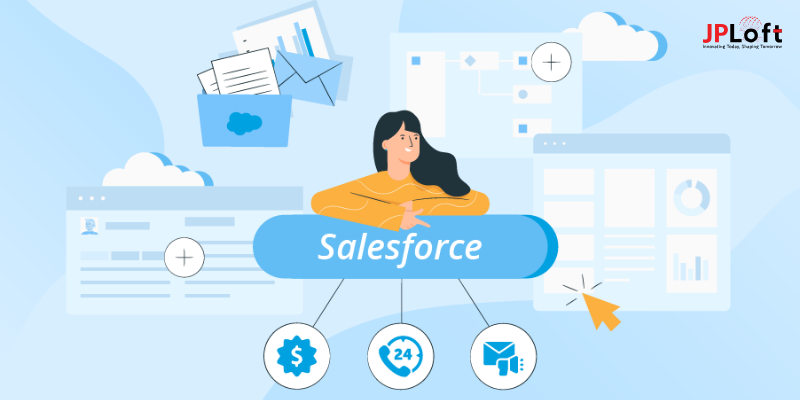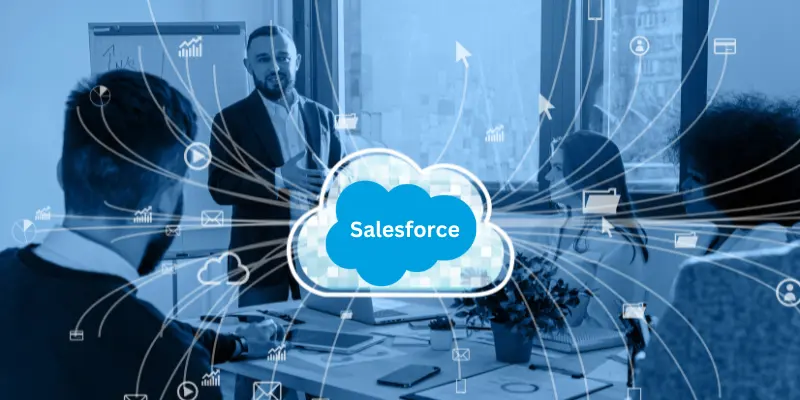Adopting Salesforce implementation can be a wise strategic move for companies hoping to streamline operations, strengthen customer relations, and spur overall expansion. But one question remains for decision-makers considering its enormous effect on organizational efficiency and profit: "How much will Salesforce Implementation Cost?".
This inquiry should not be dismissed lightly, given how valuable Salesforce implementation could be in increasing organization efficiency and profits.
Salesforce Implementation Costs can depend heavily on factors like customization levels and complexity of business processes, as well as specific organizational needs.
To effectively navigate their financial needs with Salesforce implementation solutions, businesses often turn to Salesforce development companies specializing in unleashing their full potential. Experienced firms bring unique solutions that fit individual business requirements to the table.
In this exploration of Salesforce Implementation Cost, we will delve into crucial elements influencing pricing, providing organizations with insight into which factors should be prioritized when pricing out an implementation project.
From customization requirements and support costs to ongoing support costs and maintenance fees incurred over time - we will bring to light each layer contributing to the overall investment of implementation of Salesforce.
Understanding Salesforce Implementation Cost: Factors, Considerations, and Estimates
For businesses deploying Salesforce successfully, understanding what factors and considerations determine its implementation costs is vital in making informed decisions regarding the investment required to implement this software platform successfully. Factors Influencing Salesforce Implementation Costs:
Scope of Implementation
The scope and scale of Salesforce implementation play an enormous role in its cost. An essential performance that solely addresses core CRM functionalities - like lead and opportunity management - tends to cost less than more extensive deployments that include customizations, integrations, and complex workflows.
Businesses should establish goals and priorities aligned with their specific requirements and budgets before initiating any implementation project.
Customization Requirements
Tailoring Salesforce to meet individual business requirements often involves customization. As customization needs become more extensive and intricate, so will its implementation cost. Custom development projects requiring extra resources - creating custom objects, fields, or workflows can increase overall expenses considerably.
Integration Complexity
Integrating Salesforce with existing systems such as ERP or marketing automation tools adds complexity to any implementation project. Depending on factors like the level and number of systems involved and compatibility issues between platforms can dramatically affect costs; seamless integration ensures data consistency while increasing the effectiveness of the Salesforce platform.
Migration of Legacy Data to Salesforce
Data migration between legacy systems and Salesforce is an integral component of implementation, depending on several factors, including volume and complexity, cleaning requirements, historical migration needs, and costs associated with each migration effort. When migrating data, a thorough approach must be taken to guarantee its accuracy and completeness during transfer.
User Training and Adoption
User training can often be overlooked but is integral to ensuring the successful rollout of Salesforce implementation. Ensuring all employees know how to utilize its features will avoid inefficiencies while increasing ROI; training materials, sessions, and ongoing support costs must all be factored into an implementation budget.
Licenses and Subscriptions
Salesforce offers multiple licensing options with differing features and capabilities for organizations of varying sizes to use the CRM solution effectively, directly impacting costs associated with licensing users within an organization and any subscription costs for additional modules or features beyond basic CRM functionalities.
Consulting and Professional Services
Businesses may opt to engage Salesforce consultants or certified implementation partners as part of a smooth deployment. Their expertise can speed up implementation time while mitigating risks; however, businesses should include a budget allocation for such costs when planning.
Support and Maintenance
The long-term success of Salesforce usage depends upon ongoing support and maintenance from businesses that use Salesforce beyond initial implementation costs. Companies should factor in post-implementation support costs like updates, troubleshooting, and meeting evolving business requirements as they compare against initial implementation expenses.
Estimating Salesforce Implementation Cost:
While providing an exact cost estimation can be challenging, businesses can follow these steps for more accurate estimating:
-
Establish Goals and Scope of Implementation: Set out clearly defined goals for Salesforce implementation and identify its scope. Prioritize features and functionalities based on business needs to determine priorities for deployment.
-
Get Advice from Experts: Seek advice from Salesforce consultants or implementation partners who specialize in this space better to understand individual requirements, challenges, and possible solutions.
-
Evaluate Customization and Integration Needs: It is necessary to ascertain the extent of customization and integration needed to predict development efforts and associated costs accurately. Performing detailed planning helps in this area.
-
Plan User Training: Be mindful of costs related to user training programs. Trained users contribute significantly to the platform's success while mitigating potential issues arising from ignorance on the user's part.
-
Licensing and Subscription Costs: Determine the number and types of licenses necessary for users and subscription costs to ensure optimal functionality of any modules or features added by an additional module or component.
-
Budget for Consulting and Support: When creating your budget for Salesforce implementation or support expenses, include costs related to hiring consultants or implementation partners and future support costs post-implementation.
Steps for Custom Salesforce Development
Here are the essential steps for designing tailored Salesforce solutions to assist businesses in their quest for optimized CRM.
Understanding Your Business Requirements
Custom Salesforce Development begins by gathering an in-depth knowledge of business requirements from key stakeholders to establish pain points, operational difficulties, and future growth objectives.
By conducting thorough interviews and workshops, developers can glean essential insights that provide a basis for customization processes.
Planning and Strategy
Once business requirements have been properly collected, the next step in the Custom Salesforce Development project should be planning an extensive strategy. This involves outlining its scope and setting realistic timelines and budgets. A well-crafted approach ensures that development processes align closely with organizational goals.
Data Modeling and Architecture Design
Successful Custom Salesforce Development rests upon an excellent data modeling and architecture design strategy. To craft effective custom solutions that align with an organization's long-term vision, developers need a detailed blueprint describing all objects, relationships, fields, and data integrity considerations within the Salesforce environment. In this phase, developers also consider security features like access controls.
Custom Development and Coding
Once the groundwork has been laid, custom development begins in earnest. This requires writing code that implements planned features and functionalities using Salesforce developers' Apex programming language - including triggers, classes, and controllers to meet them.
Custom Visualforce pages and Lightning components are created to enhance user experiences while remaining seamless for an optimal experience. Rigorous testing ensures any bugs or issues can be identified and addressed quickly.
Integration with External Systems
Many businesses rely on various applications and systems to streamline their operations, and custom Salesforce Development often involves connecting Salesforce to them for seamless workflow management.
Integrating customized solutions seamlessly with ERP systems, marketing automation tools, or third-party apps is crucial for optimizing their effectiveness.
User Interface and Experience Design
Delivering a user-friendly software solution requires creating an accessible, intuitive, and visually attractive user experience - this is especially true of custom Salesforce Development, where UI/UX design takes center stage to ensure customized features align with its look and feel and improve user adoption by offering intuitive yet aesthetically pleasing functionality that resonates with end-users.
Quality Assurance and Testing
Proper testing is a critical element in Custom Salesforce Development to ensure a flawless solution is created. Quality Assurance (QA) processes include unit, integration, and user acceptance testing (UAT). Teams dedicated to this aspect carefully examine custom code, assess integrations between third-party software solutions, and check that solutions satisfy specified criteria before being deployed in live environments.
Deployment and User Training
Once the custom solution has passed testing, its deployment requires careful consideration to minimize disruptions to ongoing operations. Deploying Salesforce customizations necessitates cautious planning to reduce interruptions.
User training ensures end-users become acquainted with new features and functionalities, with smooth deployment and comprehensive instruction leading to an effortless transition into customized Salesforce environments.
Ongoing Support and Maintenance
Custom Salesforce Development doesn't stop after deployment: ongoing support and maintenance are vital to address any potential post-launch issues and maintain optimal functionality of customized solutions. Regular updates, monitoring, and preventative measures help extend its longevity while safeguarding its efficacy and success.
Tips to Hire a Salesforce Developer
Here are a few essential tips to assist in selecting and to hire a Salesforce developer, helping ensure an informed choice that fulfills your organization's specific requirements.
Define Your Requirements Clearly
Before embarking on the hiring process, your organization must have an in-depth knowledge of its requirements for Salesforce development projects and developers.
Establish the scope of a Salesforce development project, determine its functionalities needed, and outline necessary skills and expertise requirements from developers. This clarity will not only assist with crafting targeted job descriptions but also help potential candidates understand your expectations.
Search for Certified Developers
Salesforce provides various certifications for developers focusing on different platform areas. When seeking candidates with these certifications, such as Salesforce Certified Platform Developer I and II or Commerce Cloud Digital Developer.
These certifications demonstrate a developer's mastery of Salesforce development and show they remain up-to-date with industry standards.
Assess Technical Proficiency
A Salesforce developer requires solid technical capabilities to work effectively on this platform. When interviewing candidates for roles as Salesforce developers, assess their proficiency with programming languages such as Apex (Salesforce's programming language),Visualforce, and Lightning components, database management skills, integration capabilities, and the capacity for creating workflows and optimizing them.
Examine Industry Knowledge
Technical knowledge can only go so far in solving business needs; experience is also vital. A candidate knowledgeable about your industry's specific challenges and requirements will be better able to tailor Salesforce solutions according to your business requirements. Search for developers with similar project experience as yours and those familiar with its processes.
Effective Communication
Assess Communication Skills Excellent communication is paramount in any development project, particularly those using Salesforce as their CMS system. A Salesforce developer needs to be capable of explaining complex technical concepts clearly. Inquire into their communication abilities during an interview session, as this can ensure seamless cooperation among team members and stakeholders.
Review Problem-Solving Abilities
Salesforce development often necessitates solving complex challenges. Assess a candidate's problem-solving abilities through real-world scenarios or case studies related to Salesforce development - this will reveal insights into their analytical skills, creativity, and approach to overcoming barriers.
Check for Team Collaboration
Salesforce development is rarely undertaken solo; developers must collaborate closely with administrators, analysts, and other critical players for completion. When hiring candidates to develop Salesforce solutions, seek those with proven teamwork experience; this ensures a more straightforward development process and successful implementation.
Consider Cultural Fit
Beyond technical abilities and experience, carefully assess a candidate's cultural fit within your organization. Evaluate how well their values, work culture, and mission align. A developer who shares your core principles will more likely integrate seamlessly into your team environment while contributing positively to its culture.
Conclusion
Understanding the costs of Salesforce implementation is vital to software development companies seeking to take full advantage of its powerful CRM platform. Performance cost analysis should consider various elements, including licensing fees, customization services, integration requirements, and maintenance fees.
As demonstrated, an adequate budget should consider direct expenses and indirect ones related to training, support, and any potential business process reengineering projects.
While implementation costs for Salesforce may differ significantly depending on an organization's size, industry, and needs, it is vital to recognize that investing in such an intelligent CRM solution as Salesforce can bring considerable returns in terms of increased productivity, streamlining operations and improved customer relations; thus viewing its cost as more of an expenditure than an expense.
Experienced software development firms can prove invaluable when embarking on Salesforce implementation, offering expert knowledge and proven results to facilitate a more straightforward implementation process and reduce risks of unexpected expenses.
Businesses can leverage the expertise of top software development firms to reap the benefits of tailored solutions, rapid deployment, and ongoing support - ultimately optimizing the return on investment in Salesforce.
FAQs
1. What factors determine Salesforce Implementation Costs?
Implementation costs depend upon factors like customization requirements, data migration costs, training fees, and integration into existing systems.
2. Are There Different Pricing Models for Salesforce Implementation?
Salesforce Implementation Costs may depend upon per-user pricing models or project-based prices - depending upon the complexity and scale of implementation projects.
3. How much would it cost my company to implement Salesforce?
In order to estimate implementation costs for Salesforce, consider factors like user count, desired features and integration needs, and any customization or third-party app expenses incurred during deployment.
4. Are there hidden costs associated with Salesforce implementation?
While Salesforce provides transparent pricing, potential hidden expenses could come from unexpected customization needs, additional training requirements, or data quality issues during migration.
5. Can I reduce Salesforce Implementation Costs by choosing standard configurations and features?
Choosing standard configurations and features may reduce implementation costs, but customization may still be required based on specific business needs.
6. What role does data migration play in determining Salesforce Implementation Costs?
Migration complexity plays an essential part, including volume, quality considerations, and legacy system integration needs that impact expenses for moving data to Salesforce.
7. Are the ongoing support costs included with my Salesforce Implementation Costs?
No. Ongoing support services typically form part of an additional investment after implementation. Businesses may choose the support option depending on their post-implementation needs.
8. Can my Salesforce implementation grow with my business without significant cost increases?
Salesforce is highly scalable; however, adding features, users, or integrations may incur extra expenses; planning can help manage future costs more effectively.
9. Are There Cost-Saving Strategies for Salesforce Implementation?
Some cost-saving strategies associated with Salesforce implementation include prioritizing essential features, using out-of-the-box functionalities more extensively, and investing in user training to decrease support and troubleshooting costs.
10. Can I negotiate Salesforce Implementation Costs with my service provider?
Absolutely - especially in larger implementation projects where cost may become an issue. Discussing your unique requirements and budget constraints with them may allow them to create an appropriate solution tailored to them.













Share this blog